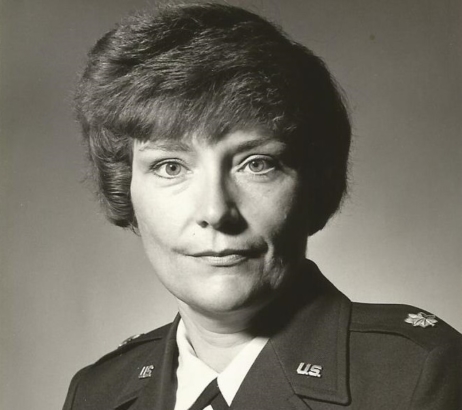With a career trajectory like no other, Jean Maxwell Kohler ’70 has made an impact very few can even dream of.
A retired lieutenant colonel in the United States Air Force, Kohler always depended on her education and passion for learning new things to propel her to new heights in her career. From being one of the first students at Capital to take a computer class to overseeing computer software for the United States Central Command at the start of the first Gulf War, Kohler and computers have always gone hand in hand.
Interested in nursing when she first stepped foot on campus because “that’s what women did back in the ’60s,” Kohler was encouraged by her professors to explore her interests in chemistry and math.
“Being at Capital, you never saw any resistance. In fact, you were encouraged to look for opportunities,” said Kohler. “For instance, when a professor would say, there’s this National Science Foundation Grant and I think you should apply – it wasn’t an issue. You want to be a chemistry and math dual major – sure! You could do that. If you look at the class of 1970, a lot of us had trailblazing experiences, because that was the time.”
After graduating from Capital as a published author in the Journal of Organic Chemistry, Kohler left Ohio and explored life outside of her Midwest roots. She went to the University of Colorado Boulder, and her interest in computers only grew.
“IBM had a huge research facility just outside of town. They were working on what would become the workforce mainframe computer of the ’80s there,” said Kohler. “So, I started taking some of my extra classes over in the computer science department just for fun. I had more fun in the computer science classes than I did in the chemistry lab.”
After deciding that she wanted to stay in the “computer business,” Kohler expressed interest in joining the USAF and was heavily recruited.
“We were still in the process of being integrated as women, still separate. In my Officers Training School class, we had some of the first woman pilots, and we graduated with our lieutenant bars just as they were beginning to increase the number of women in the military,” said Kohler. “I was always at that leading front all the way through my career.”
At that time, the military was just beginning to acknowledge the impact computers could have on all day-to-day activities and even deployment operations.
“Strategic Air Command was responsible for all the Soviet Union and communist area intelligence. We processed all of that on our computers, and we had the nuclear war plan,” said Kohler. “Cruise missiles were just coming in, and we were doing all that ground training. By the way, that’s where your GPS came from. That was developed so we could do cruise missiles.”
While at the United States European Command, Kohler was essential in putting general-purpose computers on the command control airplanes.
“I flew as the intel officer on the Airborne Command post in the European Command. I was the in the only position in the Air Force where a computer officer had wings,” said Kohler. “I got to see a great deal of NATO.”
As the miltary prepared for deployment for the first Gulf War in 1990, Kohler’s leadership and computer knowledge was pushed to center stage. She was in charge of all computer software for the United States Central Command.
“Computers had become so important with what we needed to do that we could not do a deployment without them,” said Kohler.
“The second thing we realized was that the United States military could not go anywhere on a major deployment without women. Women had become so ingrained in not only the reserve and the guard and the active duty – the whole system – that no unit could go combat-ready without taking women. We had to count on computers and our women.”
While Kohler may have been the only woman in a room full of general officers or among the few woman faculty at the Air Force Academy, her attitude was largely shaped by the lessons she learned years earlier.
“It was a combination of being at Capital where you never saw any resistance combined with my Girl Scouts experience,” said Kohler. “In Girl Scouts, you are taught at an early age to try things. You can do it.”
Jean Kohler was named a Girl Scouts Woman of Distinction in 1992. Learn more about the impact Girl Scouts had on her life at https://www.youtube.com/watch?v=xcAGO7KmBZI
